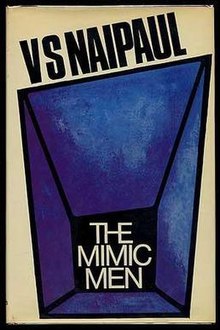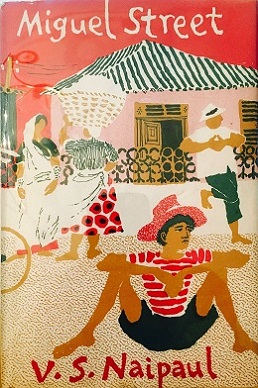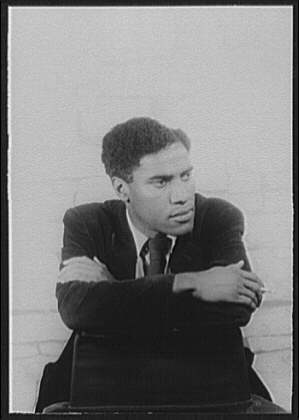 First edition | |
| Author | V. S. Naipaul |
|---|---|
| Country | United Kingdom |
| Language | English |
| Genre | Postcolonial fiction |
| Publisher | Andre Deutsch |
Publication date | 1967 |
The Mimic Men is a novel by V. S. Naipaul, first published by Andre Deutsch in the UK in 1967.
 First edition | |
| Author | V. S. Naipaul |
|---|---|
| Country | United Kingdom |
| Language | English |
| Genre | Postcolonial fiction |
| Publisher | Andre Deutsch |
Publication date | 1967 |
The Mimic Men is a novel by V. S. Naipaul, first published by Andre Deutsch in the UK in 1967.
Not long after finishing A Flag on the Island , Naipaul began work on the novel The Mimic Men, though for almost a year he did not make significant progress. [1] At the end of this period, he was offered a Writer-in-Residence fellowship at Makerere University in Kampala, Uganda. [2] There, in early 1966, Naipaul began to rewrite his material, and went on to complete the novel quickly. [3] The finished novel broke new ground for him. [3] Unlike his earlier fiction, it is not comic. [4] It does not unfold chronologically. [5] Its language is allusive and ironic, and its overall structure is whimsical. [6] It has strands of both fiction and non-fiction, a precursor of Naipaul's approach in later novels. [7] It is intermittently dense, even obscure, [5] but it also has beautiful passages, especially in the descriptions of the fictional tropical island of Isabella. The subject of sex appears explicitly for the first time in Naipaul's work. [8]
The plot, to the extent that there is one, is centred on Ralph Singh, an Indo-Caribbean politician from Isabella who narrates in the first person. [6] Singh is in exile in London and attempting to write his political memoirs. [6] Earlier, in the immediate aftermath of decolonisation in a number of British colonies in the late 1950s and early 1960s, Singh shared political power with a more powerful Afro-Caribbean politician. Soon the memoirs take on a more personal aspect. There are flashbacks to the formative and defining periods of Singh's life. In many of these, during crucial moments, whether during his childhood, his married life, or his political career, he appears to abandon engagement and enterprise. [6] He rationalises later that these belong only to fully made societies.
When The Mimic Men was published, it received generally positive critical notice. In particular, Caribbean politicians such as Michael Manley and Eric Williams weighed in, the latter writing, "V. S. Naipaul's description of West Indians as 'mimic men' is harsh but true ..." [9]

The Merchant of Venice is a play by William Shakespeare, believed to have been written between 1596 and 1598. A merchant in Venice named Antonio defaults on a large loan provided by a Jewish moneylender, Shylock.

Paul Edward Theroux is an American novelist and travel writer who has written numerous books, including the travelogue The Great Railway Bazaar (1975). Some of his works of fiction have been adapted as feature films. He was awarded the 1981 James Tait Black Memorial Prize for his novel The Mosquito Coast, which was adapted for the 1986 movie of the same name and the 2021 television series of the same name.
Shiva Naipaul, born Shivadhar Srinivasa Naipaul in Port of Spain, Trinidad and Tobago, was an Indo-Trinidadian and British novelist and journalist.
Bryan Stanley William Johnson was an English experimental novelist, poet and literary critic. He also produced television programmes and made films.

Miguel Street is a collection of linked short stories by V. S. Naipaul set in wartime Trinidad and Tobago. The stories draw on the author's childhood memories of Port of Spain. The author lived with his family in the Woodbrook district of the city in the 1940s, and the street in question, Luis Street, has been taken to be the model of Miguel Street. Some of the inhabitants are members of the Hindu community to which Naipaul belonged. Naipaul also draws on wider Trinidadian culture, referring to cricket and quoting a number of lyrics by black calypso singers.

James Gordon Farrell was an English-born novelist of Irish descent. He gained prominence for a series of novels known as "the Empire Trilogy", which deal with the political and human consequences of British colonial rule.

Queen's Royal College, referred to for short as QRC, or "The College" by alumni, is a secondary school in Trinidad and Tobago. Originally a boarding school and grammar school, the secular college is selective and noted for its German Renaissance architecture, academic performance and alumni representation in sports, politics and science in Trinidad and Tobago and globally.
Clive John Sinclair was a British author who published several award-winning novels and collections of short stories, including Hearts of Gold (1979), Bedbugs (1982) and The Lady with the Laptop (1996).
Caribbean literature is the literature of the various territories of the Caribbean region. Literature in English from the former British West Indies may be referred to as Anglo-Caribbean or, in historical contexts, as West Indian literature. Most of these territories have become independent nations since the 1960s, though some retain colonial ties to the United Kingdom. They share, apart from the English language, a number of political, cultural, and social ties which make it useful to consider their literary output in a single category. The more wide-ranging term "Caribbean literature" generally refers to the literature of all Caribbean territories regardless of language—whether written in English, Spanish, French, Hindustani, or Dutch, or one of numerous creoles.
Ajai Singh "Sonny" Mehta was an Indian editor and the editor-in-chief of Alfred A. Knopf and chairman of the Knopf Doubleday Publishing Group.

Sir Hugh Charles Clifford, was a British colonial administrator.

George William Lamming OCC was a Barbadian novelist, essayist, and poet. He first won critical acclaim for In the Castle of My Skin, his 1953 debut novel. He also held academic posts, including as a distinguished visiting professor at Duke University and a visiting professor in the Africana Studies Department of Brown University, and lectured extensively worldwide.
The Lonely Londoners is a 1956 novel by Trinidadian author Samuel Selvon. Its publication was one of the first to focus on poor, working-class black people following the enactment of the British Nationality Act 1948 alongside George Lamming's (1954) novel The Emigrants. The Lonely Londoners was included on the "Big Jubilee Read" list of 70 books selected by a panel of experts, and announced in April 2022 by the BBC and The Reading Agency, to celebrate Queen Elizabeth II's platinum jubilee in June 2022.

Beyond Belief: Islamic Excursions among the Converted Peoples is a non-fiction book by V. S. Naipaul published by Vintage Books in 1998. It was written as a sequel to Naipaul's Among the Believers: An Islamic Journey (1979).

The Middle Passage: The Caribbean Revisited is a 1962 book-length essay and travelogue by V. S. Naipaul. It is his first book-length work of non-fiction.
Michel Foucault (1926–1984) was a prominent twentieth-century French philosopher, who wrote prolifically. Many of his works were translated into English. Works from his later years remain unpublished.

A Flag on the Island is a collection of short stories written by V.S. Naipaul, and first published by André Deutsch in 1967. It includes the title novella, "A Flag on the Island," outtakes from previous books such as "The Enemy", from Miguel Street, and pieces published in periodicals in Britain or the United States. The book is dedicated to Diana Athill.

Sir Vidiadhar Surajprasad Naipaul was a Trinidadian-born British writer of works of fiction and nonfiction in English. He is known for his comic early novels set in Trinidad, his bleaker novels of alienation in the wider world, and his vigilant chronicles of life and travels. He wrote in prose that was widely admired, but his views sometimes aroused controversy. He published more than thirty books over fifty years.
Mohamed Ismith Khan, better known as Ismith Khan, was a Trinidad and Tobago-born American author and educator. He is best known for his novel The Jumbie Bird, a semi-autobiographical work which blends Indian and Afro-Caribbean mythology and experience to explore the creation of a new Indo-Caribbean identity.
Robert Flavell Micklewright (1923–2013) was a British artist, illustrator and designer. He worked as a freelancer and designed dust jackets for books by C. P. Snow and V. S. Naipaul, and posters for London Transport. According to The Guardian, his work was "always of a high standard".